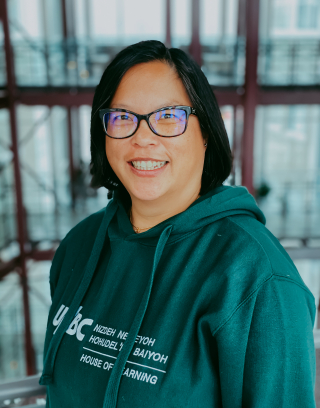
May 4, 2024 – From Feelings to Knowing
On May 4th, I went to the Chinese Canadian Museum in Vancouver with my sister. I have shared a couple of photos that had a huge impact on me when looking at the feature exhibit, “The Paper Trail to the 1923 Chinese Exclusion Act.” Over the last few years, I am slowly but surely learning more about the history of the Chinese in Canada. Living in the north, I am aware of the railway, gold rush, and the canneries. I don’t know the history of Chinese Canadians in northern British Columbia that well, but I intend to learn more about it. If anything, I almost feel that I was part of the wake of this history being born and raised in Prince Rupert, BC as a second-generation Chinese Canadian. My parents and sister immigrated into Canada from Hong Kong in 1968. My parents did not talk much about this lived experience.
The Chinese Canadian Museum did an excellent job on displaying the artifacts of this horrific past. Knowing that there was a Chinese Exclusion Act implemented in 1923 and it was first implemented on July 1st Dominion Day (or Canada Day) (aka., the Day of Humiliation for Chinese Canadians). I had no idea. From 1885 to 1923, Chinese immigrants paid a head tax to come to Canada in search for a better life, while Canada was in search for labourers. “By 1923, the government of Canada had collected over $33 million in head tax.” The head tax started at $50 per person and inflated to $500. According to Google, $500 in 1923 equates to $9,075.33 in 2024. When the Chinese Exclusion Act was implemented (and head tax eliminated), every Chinese person, regardless of age, gender, and if they were born in Canada or not. Not registering risked being deported, fined, or detained. Moreover, spouses and children were restricted from immigrating into Canada.
Look at the image above. The header reads on that document, “Department of Immigration and Colonization – Chinese Immigration Services.” The intentionality behind that title from the Dominion of Canada is on the one hand, validating, and on the other hand, sickening. I am noticing within my own life that what I imagined in my own upbringing in my family as a second-generation Chinese Canadian was something that I’ve always denied but 100% aware of and often sensitive too. One day, it was demonstrated to me (and witnessed by others) that what I had felt and perceived as a child (and adult) was true. The reveal was initially shocking, over time the reveal was validating and solace-making. I could let those ideas go. Now, with the ideas of racism, unconscious bias, and lateral violence are also real.
Look at the image below. I’ve always hated the word “oriental” and now I see why. Being referred to as “Orientals of Canada” and the headline of the Victoria Daily Times that reads “Must Bar Oriental Completely to Save B.C. for White Race” is alarming and disarming to say the least. Only 100 years ago that tThe Chinese Immigration Act, 1923 (Chinese Exclusion Act) was introduced to Canada and repealed on May 14, 1947 after the second world war. “Asian immigration included spouses and unmarried children under 18 years old “Asian immigration was limited to spouses and unmarried children aged 18 or younger of men already living in Canada.” The age changed to under 25 years for dependents in 1955. It was only until 1967 when “overt racial restrictions were removed.” This policy change makes sense knowing that my parents immigrated to Canada in 1968.
My parents and sister (who was 2-years old at the time) immigrated into Canada on the point system. The points-based system was first implemented in 1967. As an adult, I understand now that my parents were my colonizers. They were only being obedient to Canadian policies and aimed to gain a better life in Canada. They wanted my siblings and I to be “Canadians.” My twin brother and I were born in 1970. We both don’t speak or understand Cantonese or have much understanding of Chinese culture. We grew up Canadian (based on my parents interpretation of what it meant to be Canadian). I realized this idea a handful of years ago as I am taking the time to unpack my ethnic identity, positionality, and my experiences.
My colleague and friend recommended a book to me, “Real Americans: A Novel” by Rachel Khong. I was so entranced by the book as many of the stories, albeit fiction, were very real to me. I understood the nuances portrayed in the book and that disconnection with oneself, culture, and language created high levels of uncertainty in addition to the lack of acknowledgement, stories, and connection with one’s parents who immigrated into the country. The Americanized character learned Chinese as an adult. I am/was very tempted to do the same so that I can gain a better understanding of myself, my parents, and my ethnic identity. Often, I feel lost, like this character and related to her story and journey through life.
May is Asian Heritage Month. The Chinese Canadian Museum and Chinatown Storytelling Centre offered another insight of Chinese immigrants and experience in Canada. I might go back to these places before I leave the Lower Mainland. I am compelled to learn more and be able to contextualize the experience for me as a second-generation Chinese Canadian. I also wonder why this Canadian history is so important to me as “child #3” versus my older siblings. I believe that we had different experiences growing up in Canada in my family that were impacted by the experiences endured by my parents. I am also curious about anti-Asian or anti-Chinese hate that continues to persist in Canada, in particular, after the pandemic.

Reference: https://parks.canada.ca/culture/designation/evenement-event/exclusion-chinois-chinese





Leave a Reply